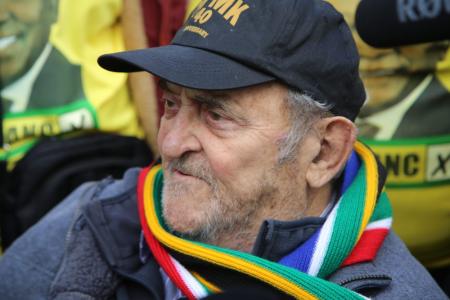
Archive category
Name of publication
Publication date
Published date
Related Collections from the Archive
Related content
As a white person in white-ruled South Africa, Denis Goldberg chose to be part of the struggles of the oppressed rather than live in the glare of white opulence. His passing is the departure of an icon.
Goldberg belongs to those who changed the history of South Africa from the racist past to the non-racial present, and to a future where the colour of your skin will no longer determine your destiny. A future when your destiny would be determined by the value you added to your community and to the society.
Denis Goldberg was released from the white section of Pretoria Local Prison in 1985 after serving 22 years of his life sentence. As accused number 3 in the Rivonia trial, he was the only white person alongside Nelson Mandela, Walter Sisulu, Ahmed Kathrada, Govan Mbeki and their comrades to face the likelihood of the death penalty. He was a founding member of uMkhonto weSizwe in the Western Cape, and in 1962 he was a commander in the first training exercise for MK cadres at Mamre together with Looksmart Solwandle Ngudle, later murdered in prison by the security police.
Goldberg understood it is not the colour of your skin that determines who you are in society but your contribution to the common good.
His release nearly five years ahead of his Rivonia Trial colleagues created mistrust among some. Denis and his first wife Esme were Jewish, and while Esme and their son David were living in exile in London, their daughter Hilary was living in Israel on a kibbutz (rural community). Hilary asked the kibbutz to struggle for Denis’s release, and it organised visits to him in jail and also a visit to London, where prime minister Margaret Thatcher asked apartheid president PW Botha to release him.
They released him, a white prisoner, more than five years ahead of his comrades on Robben Island, most of them older than him. Goldberg flew directly to Israel, where he stayed for 19 days with MK veteran Arthur Goldreich, who had been arrested at Liliesleaf Farm in Rivonia but escaped from police cells. Then he flew to London to rejoin Esme and his son David.
For some time the ANC leadership in exile was not sure how to handle him. They were not sure about the conditions of his release. For the Nationalist party and apartheid regime this was good; any confusion and mistrust in the ANC should be encouraged. At his level of authority, Goldberg would have been co-opted into the NEC of the ANC if there were no doubts about him.
Unlike the other Rivonia Trialists after their release who toured ANC camps and venues addressing meetings, Goldberg was not paraded in ANC camps and venues after his release. The apartheid regime had managed to create mistrust along colour lines ensuring that Goldberg, a white comrade, was treated differently and better than his black and Indian comrades. The conditions of white prisoners were always better than those of black prisoners; this was to sow distrust between the races.
In the UK, Goldberg lived with complete integrity. He campaigned for the end of apartheid, and when Nelson Mandela was elected president, he became the founding director of Community H.E.A.R.T. (Health, Education and Reconstruction Training), a charity that teaches self-help through local initiatives in South Africa.
After suffering the heavy losses from illnesses of Esme in 2000 and of Hilary in 2002, Denis returned to live in South Africa in the Western Cape, with his second wife, Edelgard, in 2002, as adviser to Ronnie Kasrils, then minister of water affairs. Denis was 69 and a former engineer. Edelgard died in 2006.
In the later years of his life, Denis Goldberg was again called upon to save the ANC during the government of President Jacob Zuma, when it became clear that Zuma was not living according to the ANC policy, Through the eye of Needle, and was using state money to build his private Nkandla compound.
With his fellow Rivonia Trial comrades, Ahmed Kathrada and Andrew Mlangeni, Denis Goldberg resumed leadership at the head of the group 101 Veterans and Stalwarts to demand that Zuma must resign as South African president. By that time it was clear that the National Executive Committee of the ANC was paralysed and subdued.
In April 2017, when he was 84, he wrote to Veterans and Stalwarts members calling for a reformed ANC and the “need to deal firmly with corruption and greed at all levels in government and society”.
Denis Goldberg raised his hand again and again to save the country and the ANC. His honesty, integrity and courage are a beacon for our country today and for the future.
He belongs to the breed that triumphed over apartheid and over racism.
Despite all the hardships in Pretoria Local Prison, this man stood for the best values of mankind.
Farewell Commander Goldberg. We will always remember you.